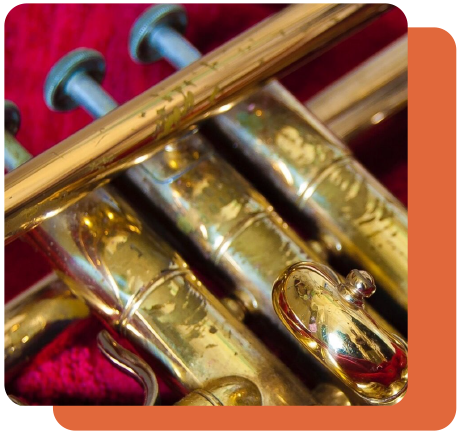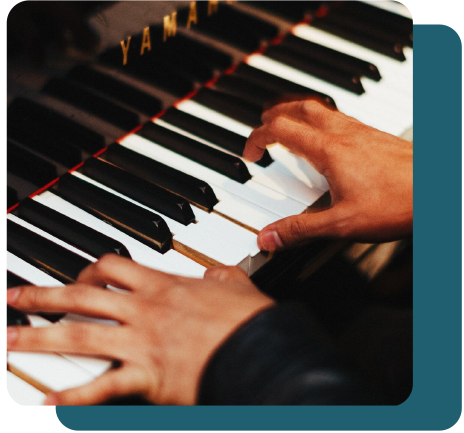
PIANOS/KEYBOARDS
If you are brand new to the piano, it is highly recommended to start out with purchasing a keyboard first and then gradually expand to purchasing a piano.
The trick to purchasing a keyboard is to find the closest match possible to an acoustic piano. A good keyboard will give a beginning student a great start as it supports their budding technique. The name brand of the instrument is not especially relevant, but there are some key features you will want to ensure your new keyboard includes:
- Full-size keyboard with all 88 keys
- Weighted keys (also referred to as “touch-sensitive” or “hammered-grade action”)
- Includes or supports a foot pedal (also referred to as “sustain” or “damper” pedal)
If you are interested in purchasing a piano, spinet and upright pianos are both affordable options, as well as a good used piano. The name brand of the instrument is not as important as finding a piano that fits the needs of the student and their budget!
You should be able to find keyboards and pianos at Steinway Piano Gallery, Evola Music, Guitar Center, and Costco.
You can expect to spend about $600-$1,500 for a keyboard, depending on the quality of the keyboard. You can expect to spend at least $1,000 for a piano, depending on the quality of the instrument. Pianos may cost anywhere from $1,000 to $50,000 or more!
GUITARS, BASS GUITARS, & UKULELES
Guitars and bass guitars come in multiple sizes: 1/4, 2/4, 3/4, and 4/4 (full). It’s recommended to go to a physical store such as Guitar Center, Marshall Music Co, Cameron’s Music, or Anderson Music Co so you can check out the different sizes and see what fits your student best. Be sure to ask an employee for assistance when handling instruments! You can then buy from the store or online with confidence. We recommend renting an instrument if the student isn’t fully grown, as they may go through several sizes until they are!
Ukuleles come in several sizes as well though but most students are able to play them regardless of age. Soprano ukuleles are the most common, though concert and tenor ukuleles are pitched in the same key and similar enough to be interchangeable. We recommend soprano ukuleles for children and concert ukuleles for adults. You can find ukuleles at Guitar Center, Marshall Music Co., Cameron’s Music, and Anderson Music Co.
Acoustic or Electric? It’s all up to preference. It’s the same guitar, just different sounds. Some quality brands to consider include Fender, Squier, Epiphone, Yamaha, Ibanex, and Mitchell for guitar, and Fender, Squier, Epiphone, Yamaha, Ibanez, and Dean for bass guitar. Brands are not important when it comes to ukuleles — just find an instrument that works best for you and your budget!
Most instruments will come with a kit, but if yours happens not to, the main accessories you’ll need include a case, picks, a tuner (clip-on is preferred), and spare strings. Strings can be metal or nylon and come in a variety of thicknesses, with 0.10 – 0.46 being the standard range. It’s usually best to purchase the same type of strings that originally came with your instrument. Speak with the instrument seller or your teacher for their recommendations!
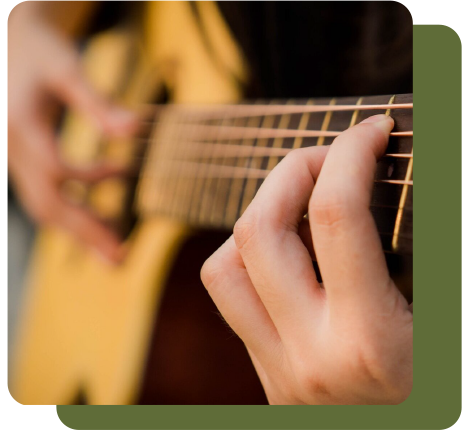
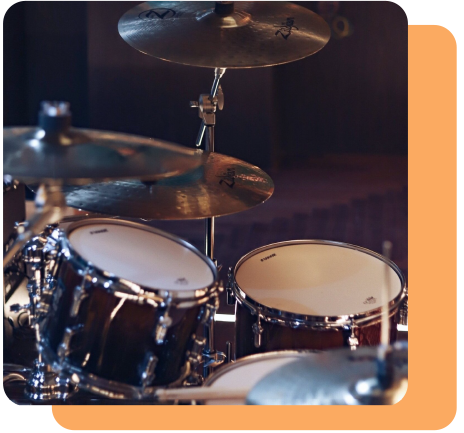
DRUM SETS
Before purchasing an instrument, you need drumsticks! Standard sticks are type 5A, 16 inches for adults and 11-14 inches for children. Anything else is up to your preference and style.
If you are brand new to drums, the best option is to wait to purchase a full drum set and instead purchase a practice pad to start. They are typically pretty cheap and are all mostly the same. You can also practice with pillows or similar objects set up on a couch to simulate the setup of a real drum set. If after a month of lessons, your student is still interested in the drums, then go for purchasing a set!
If you are ready to research and purchase a drum set, some of the recommended brands include Yamaha, Pearl, Gretsch, Sonor, Ludwig, Tama, Mapex, DW, and, for a cheaper option, PDP. Beginner 7-piece sets will typically cost at least $500. 7-piece sets include the 5 standard drums and at least 2 cymbals. You can find drum sets at Marshall Music Co., Anderson Music Co., Cameron’s Music, and Sweetwater.com.
If you’re concerned about the noise of a drum set when practicing at home, we recommend looking into an electronic set with headphones or a variety of mutes. Speak with your teacher about their recommendations!
VIOLINS, VIOLAS, & CELLOS
Violins, violas, and cellos have different sizes: 1/4, 2/4, 3/4, and 4/4 (full). When looking into a violin, viola, or cello, it’s recommended to go to a physical store so you can be sized correctly. You can then buy from the store or online with confidence. We recommend renting an instrument if the student isn’t fully grown as they may go through several sizes. By renting an instrument, you can easily upgrade to a new size later. While there isn’t a specific brand of instrument we would recommend for purchasing, many serious students will visit several shops to try out the various instruments and bows before settling on their final instrument.
Most instruments will include many of the required accessories. For violin, viola, and cello, make sure you have a case, a bow, rosin, and a set of spare strings. For violins and violas, also be sure to have a shoulder rest. For cellos, also be sure to have a chair strap or rock stop (also called a pin stop or anchor). If you’re interested in buying an instrument instead of renting, expect to pay at least $500 for a violin, $800 for a viola, and $1,000 for a cello.
Two places we would recommend for renting or buying an instrument are Shar Music in Ann Arbor and Psarianos Violins in Troy. Both have excellent reviews as well as wonderful rental programs. You can purchase rosin, strings, and other accessories at their stores or online.
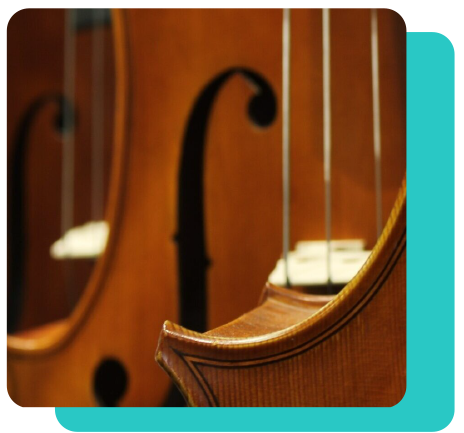
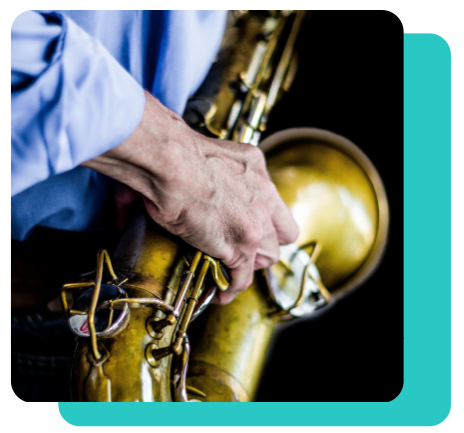
WOODWINDS
One golden rule for woodwind instruments – if the price is too good to be true, it probably is! It’s always best to go somewhere in person to view the instrument before renting or buying. Keep an eye on the quality and price – if the instrument is made out of cheap materials, some repairmen may not be able to guarantee that they can repair it if it breaks.
With used instruments, you may end up spending the same amount over time on repairs as you would on a new instrument. When trying out a used instrument or a rental, we recommend that you take it apart, view each piece individually, and reassemble it to ensure there are no issues putting it back together. Also make sure you can make a good sound and that all the keys function properly. Recommended places to go for rentals include Marshall Music Co., Anderson Music, Cameron’s Music, and Flute World (flutes only). If you’re interested in buying an instrument, expect to pay at least $500 for a flute, clarinet, or saxophone and $800 for an oboe.
Beginner flutes should have closed holes and a C foot. Recommended brands include Jupiter, Pearl, Gemeinhardt, and Yamaha. Beginner oboes should be conservatoire oboes with no thumbplate, and reeds should be medium soft, handmade by a professional. Recommended brands include Howarth, Loree, Yamaha, Selmer, and Fox. Beginner clarinets should be B-flat clarinets (also listed as Bb), and beginner saxophones should be alto saxophones. We recommend 2.5 type reeds in the Rico or Vandoren brands for both clarinet and saxophone beginners. Recommended brands for clarinet include Backun Alpha, Buffet, Selmer, and Yamaha, and for saxophone include Yamaha, Selmer, Yanagisawa, P. Mariot, and Eastman. Speak with the instrument seller or your teacher for their recommendations!
Recommended accessories, which commonly come with new and used instruments, include a case, a cleaning swab, and a polishing cloth. Oboes, clarinets, and saxophones will also need extra reeds and cork grease. Young saxophone players may also need a sling or harness to hold the instrument comfortably and a stand to set the instrument on when not in use.
BRASS INSTRUMENTS
One golden rule for brass instruments – if the price is too good to be true, it probably is! It’s always best to go somewhere in person to view the instrument before renting or buying. Keep an eye on the quality and price – if the instrument is made out of cheap materials, some repairmen may not be able to guarantee that they can repair it if it breaks.
With used instruments, you may end up spending the same amount over time on repairs as you would on a new instrument. When trying out a used instrument or a rental, we recommend that you take it apart, view each piece individually, and reassemble it to ensure there are no issues putting it back together. Also make sure you can make a good sound and that all valves or slide function properly. Recommended places to go for rentals include Marshall Music Co. (no euphoniums available), Anderson Music (no tubas available), and Cameron’s Music (no tubas available). If you’re interested in buying an instrument, expect to pay at least $500 for a trumpet, French horn, trombone, or euphonium and $1,000 for a tuba.
Beginner trumpets should be B-flat trumpets (also listed as Bb). Recommended trumpet brands include Yamaha, Getzen, Bach, King, Conn, Holton, Buescher, and Medini. Beginner French horns should be double horns. Recommend French horn brands include Conn, Holton, Yamaha, Schilke, Han Hoyer, Eastman, and King. Beginner trombones should be tenor trombones without an F trigger (also called an F attachment). Recommended trombone brands include Conn, Selmer, Bach, Yamaha, Getzen, King, Edwards, P-Bone, and Shires. Beginner euphoniums should have three valves or a 4th compensating valve. Recommended euphonium brands include Conn, Yamaha, Schiller, Besson, Miraphone, Jupiter, and Wilson. Beginner tubas should be BBb tubas and have three piston valves. Recommended tuba brands include Conn, Yamaha, Miraphone, Medini Weston, B&S, John Packer, and Jupiter.
Recommended accessories, which commonly come with new and used instruments, include a case, a polishing cloth, and a mouthpiece brush for cleaning. Valve oil is recommended for maintaining all but trombones, whereas trombones will need slide oil. Young euphonium and tuba players may also need a sling or harness to hold the instrument comfortably and a stand to set the instrument on when not in use.
Mouthpieces can vary by both size and depth, and not all brands label the sizes the same way. A student should work with their teacher to find the best size for their needs. Standard beginner mouthpieces are a Bach 7C for trumpet, a Yamaha 31B/31C2 for French horn, a Bach 12C for trombone, a Bach 6.5 AL for euphonium, and a Bach 18 or Yamaha 67C4 for tuba. Speak with the instrument seller or your teacher for their recommendations!
